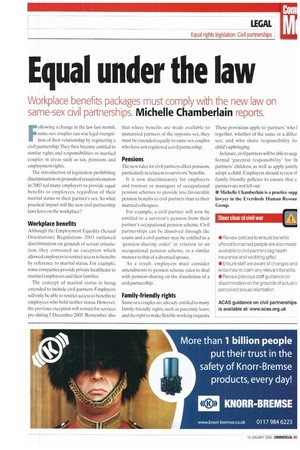Equal under the law
Page 39

If you've noticed an error in this article please click here to report it so we can fix it.
Workplace benefits packages must comply with the new law on
same-sex civil partnerships. Michelle Chamberlain reports.
Following a change in the law last month, same-sex couples can win legal recognition of their relationship by registering a civil partnership.They then become entitled to similar rights and responsibilities as married couples in areas such as tax, pensions and employment rights.
The introduction of legislation prohibiting discrimination on grounds of sexual orientation in 2003 led many employers to provide equal benefits to employees, regardless of their marital status or their partner's sex. So what practical impact will the new civil partnership laws have on the workplace?
Workplace benefits
Although the Employment Equality (Sexual Orientation) Regulations 2003 outlawed discrimination on grounds of sexual orientation, they contained an exception which allowed employers to restrict access to benefits by reference to marital status. For example, some companies provide private healthcare to married employees and their families.
The concept of marital status is being extended to include civil partners. Employers will only he able to restrict access to benefits to employees who hold neither status. However, the previous exception will remain for services pre-dating 5 December 2005. Remember also that where benefits are made available to unmarried partners of the opposite sex, they must be extended equally to same-sex couples who have not registered a civil partnership.
Pensions
The new rules for civil partners affect pensions, particularly in relation to survivors' benefits.
It is now discriminatory for employers and trustees or managers of occupational pension schemes to provide less favourable pension benefits to civil partners than to their married colleagues.
For example. a civil partner will now be entitled to a survivor's pension from their partner's occupational pension scheme. Civil partnerships can be dissolved through the courts and a civil partner may be entitled to a 'pension-sharing order' in relation to an occupational pension scheme. in a similar manner to that of a divorced spouse.
As a result, employers must consider amendments to pension scheme rules to deal with pension-sharing on the dissolution of a civil partnership.
Family-friendly rights
Same-sex couples are already entitled to many family-friendly rights, such as paternity leave and the right to make flexible working requests. These provisions apply to 'partners' who I together. whether of the same or a differ sex, and who share responsibility foi child's upbringing.
In future, civil partners will be able to acqt formal 'parental responsibility' for th partners' children, as well as apply jointly adopt a child. Employers should review th family-friendly policies to ensure that c partners are not left out.
• Michelle Chamberlain is a practice supp lawyer in the Eversheds Human Resour Group.
































































































































































































